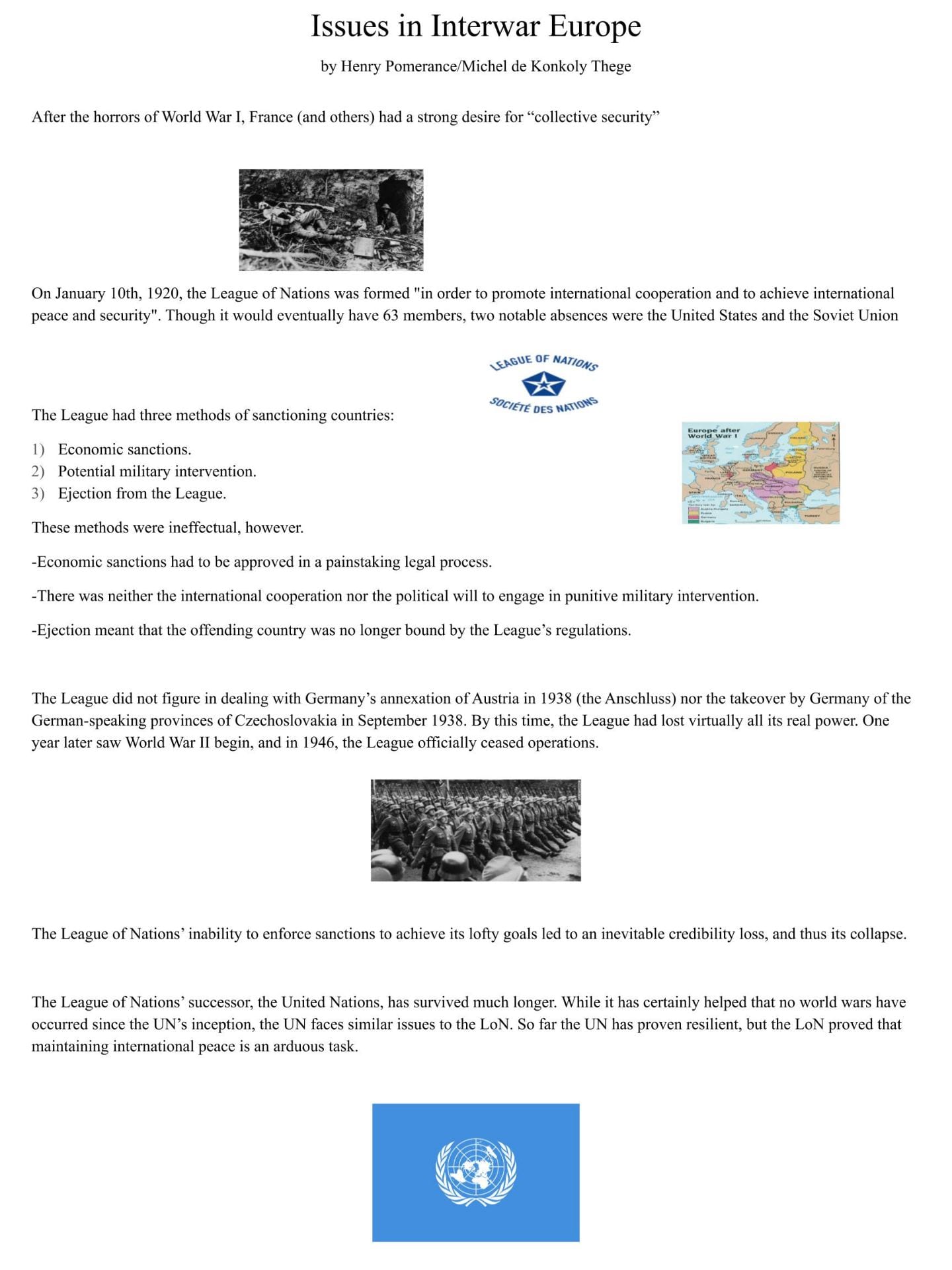Project by: Henry Pomerance (11th Grade)
Project Advisor: Michel de Konkoly Thege
Student(s)’s Advisor(s): Jacqueline Baker
It was a pleasure to work with Michel on this honors project. When I conceived of this project, I wanted to deepen my understanding of the interwar period in Europe, and I certainly accomplished this. The project consisted of research (in between meetings) and discussions of the research (during meetings). This structure was conducive to critical thinking because it forced me to analyze the research I did, multiple times. Since the majority of my research came from primary source documents, I had to make inferences and connections based on the text. Then when I brought my findings to Michel, we would further discuss my findings and analyses, while I took notes. Michel is learned in the interwar period, so he was able to give me guidance on which areas of the period to research, while also increasing the level of our conversations. Overall, the project served as an interesting add-on to my European Union class, as well as broaden my understanding of the complexities of global politics.
One the main themes of the honors project was the desire for “collective security” after the horrors of World War I. The League of Nations was the result of this desire, and its purpose was to promote peace and prosperity in countries across the world. However, a significant shortcoming of the League was its inability to effectively deter rogue nations. Indeed, powerful countries like France and the U.K. were so averse to war that they could not be counted on to assist the League in dealing with such rogue countries. Thus, as fascist regimes expanded across Europe, the League was powerless to stop them. With war an increasing threat, the League’s credibility deteriorated. By the time Hitler’s army had invaded Poland in 1939, the League had, in effect, collapsed. The world’s first try at global political cooperation had been exposed by the supposed irrationality of countries doing what was best for themselves, without caring about other countries. Today, the League’s successor, the United Nations, has fared better in the face of global turmoil. Yet, the world is more complex now than seventy years ago, and understanding the League’s flaws might help the U.N. avoid the pitfalls that led to the Second World War.
Please write a description of the project you are proposing. Why do you want to take this on, and what do you hope to learn?
This project will look into the post-World War I ideals of collective security and prevention of future wars, and why preventive measures such as the League of Nations failed, ultimately leading to World War II. I want to learn about this subject because I have never really discussed this period in my academic career, even though it was such a foundational time in history.
Critical thinking, creativity, citizenship and courage are essential LREI learning values. Explain how you’ll draw on at least one of these values to complete your proposed project?
The project is a historical examination of why war came again to Europe. I will need to employ critical thinking during this project because I will be making inferences, as well as connecting many different texts.
What is your proposed outcome? How will you be able to demonstrate successful completion of this Project? How do you plan to share your learnings with the larger LREI community (e.g., exhibit of work, poster of learnings, performance, etc.)?
I will have this project completed by the end of Trimester 2. My work will culminate in a presentation that combines both visual and textual elements. In the presentation, I will show how and why preventive measures for future wars failed, even though Europe did not want another war.
Please provide a general outline that indicates your work plan for the trimester? What are some of the key project benchmarks (i.e., goals that will help to ensure that you finish the project)?
I will look at different sources, including texts and other media throughout the process, and will add to my presentation as I research. In my meetings with Michel, I will check in with him to see if my research is on the right track for the project’s goals.
When do you plan on meeting?
Wednesday at x-block



This is a well-conceived and interesting project involving an examination of issues flowing out of the resolution of World War I in Europe. Henry and I will agree on benchmarks for completion of reading and preparation of the final presentation.
Project is approved from my perspective.
Approved